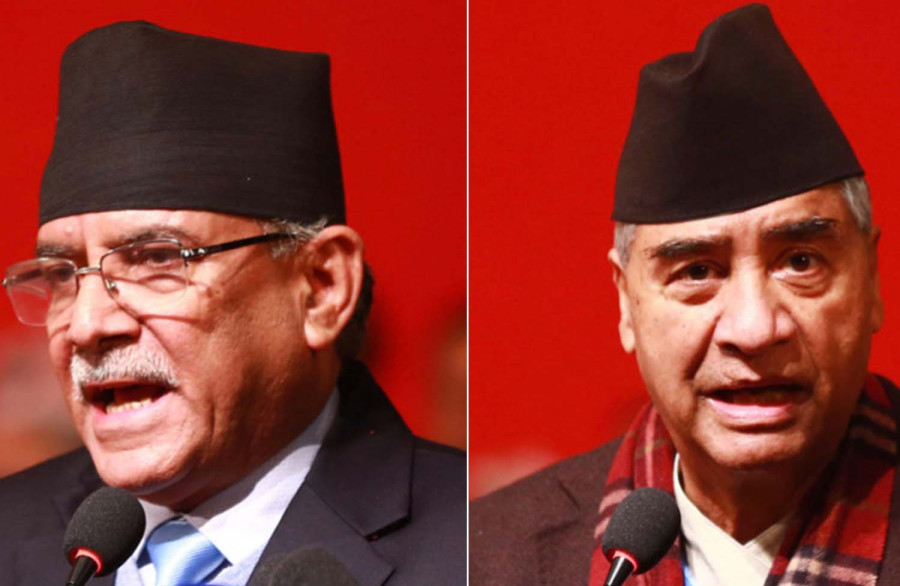Politics
Dahal and Deuba meet as conflict victims grow weary
The two leaders convened after victims pressed Dahal over stalled transitional justice process.
Post Report
When the Nepali Congress was part of the ruling coalition with the CPN (Maoist Centre) until earlier this month, both the parties advocated for a swift endorsement of the amendment bill on the Enforced Disappearances Enquiry, Truth and Reconciliation Commission Act should be endorsed without delay. They even suggested that the bill should be endorsed through a vote if the CPN-UML refuses to endorse it by consensus.
However, the Congress’s voice regarding the bill has changed after Prime Minister Pushpa Kamal Dahal, the chief of the Maoist Centre, ousted the largest party from the ruling coalition and formed a new government in partnership with the CPN-UML on March 4. Since then there has been no discussion in the bill.
In recent days, the Congress has been protesting in the House of Representatives to register its opposition to the induction of Rastriya Swatantra Party chief Rabi Lamichhane, who is accused of misusing cooperative funds, as deputy prime minister and home minister in Dahal’s Cabinet.
Amid the deadlock, Prime Minister Pushpa Kamal Dahal and Nepali Congress President Sher Bahadur Deuba held a meeting on Thursday. “Endorsement of the transitional justice bill and making Parliament effective were the major issues of discussions between the two leaders,” said Govinda Acharya, press advisor to the prime minister.
The amendment bill has been under consideration of the Law, Justice and Human Rights Committee of the House of Representatives for more than a year. It is not sure when the committee will resume discussion on the bill. Dahal has been reiterating that conclusion of the transitional justice process is his top priority.
The ‘commitment paper’ of the new ruling alliance issued a few weeks ago has listed revision of the bill one of its major priorities. Victims of the insurgency along with human rights defenders have been demanding a revision of the bill without further delay. A section of the conflict victims on March 22 had asked the government to endorse the bill before taking any decision on transitional justice.
Another section of the victims also has demanded not to delay the amendment under any pretext. Holding a meeting with Dahal on Wednesday, the victims, led by Bhagiram Chaudhary, a former chair of the Conflict Victims Common Platform, however, demanded that the government start a process to appoint office bearers in the two transitional justice commissions, as per a recent court ruling, while the law amendment process continues.
"We urged the prime minister to start the selection process within the court’s deadline using the authority to remove difficulties," said Chaudhary. Section 42 of the Act authorises the government to remove difficulties.
However, such a decision (of removing difficulties, which means appointing office bearers) must be presented in Parliament within 30 days of its commencement. Truth and Reconciliation Commission and the Commission of Investigation on Enforced Disappeared Persons have been getting extensions based on the provision.
The Supreme Court on March 12 had given the government a month to start the process to select office bearers for the two commissions.
The two commissions have been inactive since July 2022 after the government decided to extend their terms without retaining their chairmen and members. Against the government’s previous claims that the bill to amend the existing transitional justice law would be endorsed by October 2022, which would have also opened the door for recruiting new office bearers, there has been no progress.
Until the office bearers are appointed, the court had asked the government to constitute task forces within the commissions in order to carry out preliminary investigations into the victims’ complaints.
While the truth commission has received 63,718 complaints, the disappearances commission is sitting on around 2,400 cases. The victims group that met Dahal on Wednesday asked him to immediately constitute a recommendation committee to pick office bearers for the commissions ensuring that it adopts a credible selection process.
The victims have also sought time to allow filing of complaints mainly by the victims of rape and sexual violence, transfer of property of the victims of enforced disappearances, and establishing separate units within the Truth and Reconciliation Commission. Their other demand is to make public the whereabouts of the victims of enforced disappearances.
In November 2006, the then government and the Maoist party through the Comprehensive Peace Accord had committed to disclosing the whereabouts of people disappeared or killed during the decade-long insurgency within 60 days of the signing the pact. They have yet to fulfil the commitment.
"We also request the prime minister to prioritise revision of the Act and make sure the bill gets endorsed from the ongoing session of the federal parliament,” reads one of the demands of the victims.
The court in its order on March 12 had also reminded the government to immediately amend the law as per its earlier verdict. On February 26, 2015, the Supreme Court had directed the government to amend the Act’s around half a dozen provisions that allowed amnesty even in cases of serious human rights violations.




 13.12°C Kathmandu
13.12°C Kathmandu













